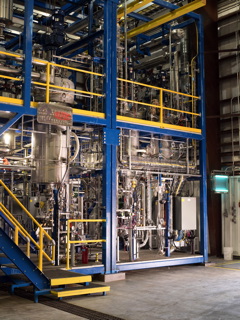DuPont & ADM Partner on Biobased Pilot Facility
- Published: May 02, 2018
DECATUR, IL | DuPont Industrial Biosciences and Archer Daniels Midland Company (ADM) report the opening of what is said to be the first biobased furan dicarboxylic methyl ester (FDME) pilot production facility in Decatur, IL. The plant is the centerpiece of a long-standing collaboration that reportedly will help bring a greater variety of sustainably sourced biomaterials into the lives of consumers. 
FDME is a molecule derived from fructose that can be used to create a variety of biobased chemicals and materials, including plastics, that the companies say are ultimately more cost-effective, efficient, and sustainable than their fossil fuel-based counterparts.
“We’re confident FDME is both the more sustainable option and the better-for-business option,” says Michael Saltzberg, Ph.D., global business director for Biomaterials at DuPont Industrial Biosciences. “This molecule, and its numerous applications, will be high-performing, cost-effective, and better for the environment. ADM’s expertise in agricultural value chains and the chemistry of carbohydrates makes them the best possible business partner on this initiative. Our goal is to bring this game-changing technology to commercial scale as quickly as possible.”
“Companies and consumers are of course concerned about their environmental footprint, but their bottom line will always be a key priority,” says ADM chief technology officer Todd Werpy. “This new, innovative product will help customers replace plastics with materials that are more environmentally friendly, better performing, and cost efficient. We’re pleased to work with DuPont, a leader in biomaterials, to bring this innovative new portfolio of solutions to customers around the globe, and we’re excited about the future of FDME.”
One of the first FDME-based polymers under development by DuPont is polytrimethylene furandicarboxyate (PTF), a polyester also made from DuPont’s proprietary Bio-PDO (1,3-propanediol). PTF is said to be a 100% renewable polymer that, in bottling applications, can be used to create plastic bottles that are lighter weight, more sustainable, and better performing.
According to DuPont and ADM, research shows that PTF has up to 10–15 times the CO2 barrier performance of traditional PET plastic, which results in a longer shelf life. With that better barrier, companies will be able to design significantly lighter weight packages, lowering the carbon emissions and significant costs related with shipping carbonated beverages.
This email address is being protected from spambots. You need JavaScript enabled to view it.




